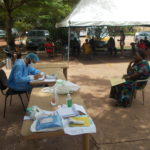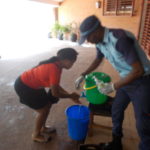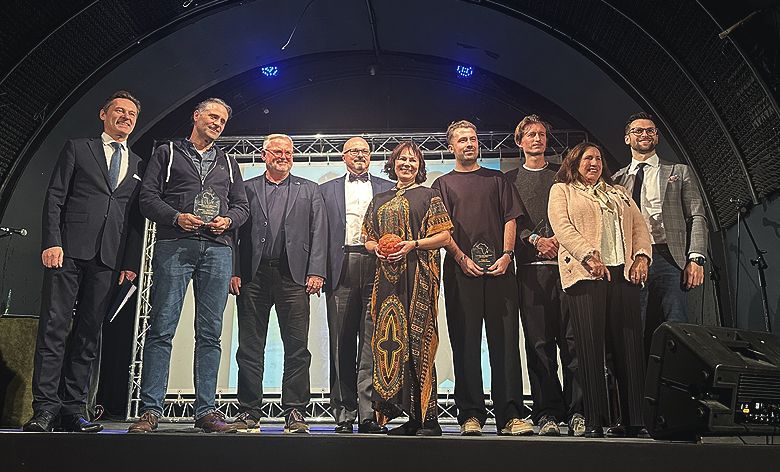Nigeria. Covid-19, An Opportunity to Improve Health Management for the Most Vulnerable
"At the moment there are few confirmed cases; the Enugu State Government has set up an isolation centre, but there is a lack of personal protective equipment and it is difficult for us to assist patients in these conditions". This is reported by Ito Diejomaoh, director of the Niger Foundation Hospital, set up in Enugu in the 1990s, on a private initiative, to provide quality medical care even to the lower-income population.
More than 200 cases are currently reported in Nigeria in 14 of the 37 states that make up the Federation; Abuja (capital) and Lagos (economic capital) are in the lead.
"The Nigerian government has taken some important steps to curb the spread of the Virus. Borders have been closed, controls, pest control and information campaigns are being carried out; the authorities in various states have begun to close schools and ban large rallies," however, reports Dr Diejomaoh, "the increase in the number of cases recorded in recent days is a worrying sign: the authorities must prepare to respond to the worst".
Emergency situations, such as this one linked to the new Coronavirus, particularly highlight the strong contradictions that characterize the "economic giant" and its great social and economic disparities.
The Nigerian health system is plagued by chronic underfunding and limited infrastructure. Moreover, according to the Nigerian Medical Association, the country has about 40,000 doctors to provide assistance to an estimated population of almost 200 million people. The physician-patient ratio, according to the World Health Organization, is one doctor for 2,500 patients, the recommended ratio is one doctor for every 1,000 patients, which means that Nigeria has less than half the doctors who should respond adequately in a non-crisis situation. There is therefore great concern about the government's ability to respond to the pandemic.
"At N.F. Hospital we are currently reducing shifts and checking all patients arriving at the hospital. We are struggling with the supply of protective equipment which today is 20 times more expensive than usual".

 The private sector seems to be helping to support the State, increasing the capacity to carry out the tests (with only five testing laboratories in the country, three of which in Lagos, the possibility to carry out rapid tests is limited) and providing reception places for those in quarantine, but the restrictions necessary to contain the Virus have a very strong impact on people's living conditions, the prospects are frightening.
"Many people live on a day job basis. They eat today what they earned yesterday. A 14-day quarantine puts the vast majority of people in desperate situations. This often means that it is very difficult to enforce the rules. The closure of a market automatically affects the livelihoods of many thousands of people".
The living conditions of the population make social distancing a concept that is difficult to apply in practice. Hygiene levels and the unavailability of running water in many areas are also transmission risks. "People are afraid because they know what they will face in case of illness". It is estimated that there are about 500 lung ventilators for more than 200 million people throughout the territory; the most populous country in Africa therefore looks with terror at the spread of the coronavirus. And more effective responses are expected from the federal government.
From these responses will come the ability to manage the emergency and perhaps, with increased investment in the health system, also the opportunity to improve the health of the most vulnerable people.
Niger Foundation Hospital is Harambee's partner for health projects. Help us to continue our initiatives, click here for a donation.
The private sector seems to be helping to support the State, increasing the capacity to carry out the tests (with only five testing laboratories in the country, three of which in Lagos, the possibility to carry out rapid tests is limited) and providing reception places for those in quarantine, but the restrictions necessary to contain the Virus have a very strong impact on people's living conditions, the prospects are frightening.
"Many people live on a day job basis. They eat today what they earned yesterday. A 14-day quarantine puts the vast majority of people in desperate situations. This often means that it is very difficult to enforce the rules. The closure of a market automatically affects the livelihoods of many thousands of people".
The living conditions of the population make social distancing a concept that is difficult to apply in practice. Hygiene levels and the unavailability of running water in many areas are also transmission risks. "People are afraid because they know what they will face in case of illness". It is estimated that there are about 500 lung ventilators for more than 200 million people throughout the territory; the most populous country in Africa therefore looks with terror at the spread of the coronavirus. And more effective responses are expected from the federal government.
From these responses will come the ability to manage the emergency and perhaps, with increased investment in the health system, also the opportunity to improve the health of the most vulnerable people.
Niger Foundation Hospital is Harambee's partner for health projects. Help us to continue our initiatives, click here for a donation.

 The private sector seems to be helping to support the State, increasing the capacity to carry out the tests (with only five testing laboratories in the country, three of which in Lagos, the possibility to carry out rapid tests is limited) and providing reception places for those in quarantine, but the restrictions necessary to contain the Virus have a very strong impact on people's living conditions, the prospects are frightening.
"Many people live on a day job basis. They eat today what they earned yesterday. A 14-day quarantine puts the vast majority of people in desperate situations. This often means that it is very difficult to enforce the rules. The closure of a market automatically affects the livelihoods of many thousands of people".
The living conditions of the population make social distancing a concept that is difficult to apply in practice. Hygiene levels and the unavailability of running water in many areas are also transmission risks. "People are afraid because they know what they will face in case of illness". It is estimated that there are about 500 lung ventilators for more than 200 million people throughout the territory; the most populous country in Africa therefore looks with terror at the spread of the coronavirus. And more effective responses are expected from the federal government.
From these responses will come the ability to manage the emergency and perhaps, with increased investment in the health system, also the opportunity to improve the health of the most vulnerable people.
Niger Foundation Hospital is Harambee's partner for health projects. Help us to continue our initiatives, click here for a donation.
The private sector seems to be helping to support the State, increasing the capacity to carry out the tests (with only five testing laboratories in the country, three of which in Lagos, the possibility to carry out rapid tests is limited) and providing reception places for those in quarantine, but the restrictions necessary to contain the Virus have a very strong impact on people's living conditions, the prospects are frightening.
"Many people live on a day job basis. They eat today what they earned yesterday. A 14-day quarantine puts the vast majority of people in desperate situations. This often means that it is very difficult to enforce the rules. The closure of a market automatically affects the livelihoods of many thousands of people".
The living conditions of the population make social distancing a concept that is difficult to apply in practice. Hygiene levels and the unavailability of running water in many areas are also transmission risks. "People are afraid because they know what they will face in case of illness". It is estimated that there are about 500 lung ventilators for more than 200 million people throughout the territory; the most populous country in Africa therefore looks with terror at the spread of the coronavirus. And more effective responses are expected from the federal government.
From these responses will come the ability to manage the emergency and perhaps, with increased investment in the health system, also the opportunity to improve the health of the most vulnerable people.
Niger Foundation Hospital is Harambee's partner for health projects. Help us to continue our initiatives, click here for a donation.






